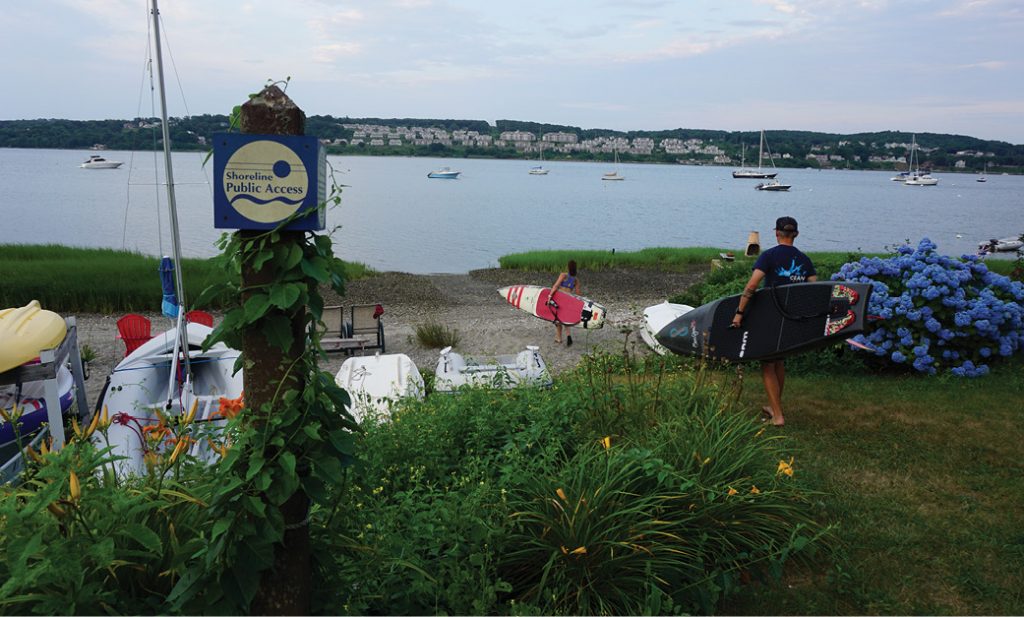By Emily Conklin, Clean Ocean Access
Everyone has the right to enjoy the coastline. In Rhode Island, this right is enshrined in our Constitution. Clean Ocean Access (COA) started out when a parking issue along the Cliff Walk in Newport, RI threatened this right to ocean recreation. A group of wave riders came together to protect their ability to access the water, and from this community effort, COA was born.
Over the past fifteen years, COA has been a leader in protecting shoreline access and ensuring safe, healthy waters on Aquidneck Island. These efforts are exemplified by the CLEAN, OCEAN, and ACCESS programs that give us our name. Together with our volunteers, we perform beach cleanups to remove and prevent marine debris, take weekly water samples to monitor water quality across Aquidneck and Conanicut Islands, and ensure all rights-of-way on Aquidneck Island remain accessible to the public. Our three foundational programs gave us a foothold in the community, and allowed us to see the connection Islanders have with our natural environment.

John & Kristin Andel preparing to paddleboard at an access point in Portsmouth, RI. © cleanoceanaccess.org
In 2021, we have our eyes on the future, and we can say with confidence that it looks bright. After a dedicated effort from our strategic planning committee, we have unveiled our first ever Strategic Plan to guide our work for three years. As a result of this process, COA has a new mission statement—“Inspire and educate the community to take action through environmentally responsible behaviors”—and a new vision—“A clean, healthy ocean that is accessible to all.”
This step will allow us to have greater influence for the communities we serve. It renews our dedication to the places and natural resources that we love, while giving us the tools to have a broader, deeper impact. We identified programmatic, fiscal, and administrative goals to position our work to achieve our mission. Within the eighteen goals, there is a defined focus on strengthening ties between COA and our communities. These strategies include recruiting community leaders to spearhead environmental efforts, continuing year-round outreach and education to inspire the next generation of environmental stewards, and listening to the needs of the community in everything we do. In building our connection to Aquidneck and Conanicut Islands, as well as throughout the state of Rhode Island, COA aspires to further the Ocean State as a leader in ocean stewardship.
Because of the trust of our community and the generosity of funding organizations such as 11th Hour Racing, we have grown to include larger initiatives that safeguard the health of our Islands, oceans, and climate. The Healthy Soils Healthy Seas Rhode Island (HSHSRI) program is one of our circular economy efforts, bringing together existing composting, waste management, education, outreach, policy, zero waste, marine debris, and water quality efforts into an integrated holistic framework.
Through an impressive partnership with composting waste haulers, local processors, and other collaborators, we have been able to facilitate composting with 41 businesses and 540 households on Aquidneck and Conanicut Islands. HSHSRI is built on the idea that improving ocean health starts on land. Food scrap diversion and composting have immense value; compost enriches soil to help it retain oxygen, nutrients, and natural antibiotics that aid plants in resisting disease. Composting food scraps and using the finished product increases plant growth, which in turn sequesters carbon from the atmosphere and returns it to the earth. Compost plays an important role in the reduction of waste, enhancing environmental and community wellbeing while closing the loop to provide a beneficial end product from food scraps that otherwise would have ended up in landfills.
Similarly, COA has partnered with TerraCycle to develop a sustainable recycling program for shrink wrap that will position the sailing and marine industry as an environmental leader. We have collected over 140,000 pounds from marinas, agricultural sites, and individual boaters to recycle into post-consumer resin that can eventually be used to make a next generation of wrap. By building these relationships, we are developing a transparent understanding of how and where the material is being processed, with the ultimate goal of creating a self-sustaining economy for shrink wrap. Together, our circular economy initiatives represent a push for us to take responsibility for ocean health by reexamining our production and waste behaviors on land.
Fundamentally, Clean Ocean Access is about the ability for everyone to access a clean, healthy ocean and coastal environment. Our programs help connect the communities we serve to solutions for the benefit of our Islands, oceans, and climate. Engaging with each other and our coastal environment is beneficial for our wellbeing as much as the coast’s. Looking forward to our big plans in 2021 and beyond, we’re proud that COA’s connection to our ocean loving community remains at the heart of it all.
Our full Strategic Plan and ongoing events and programs can be seen on our website atcleanoceanaccess.org. ■
Emily Conklin is COA’s Communications Marketing Coordinator. Her background is in marine science and environmental education. She lives in Newport.




